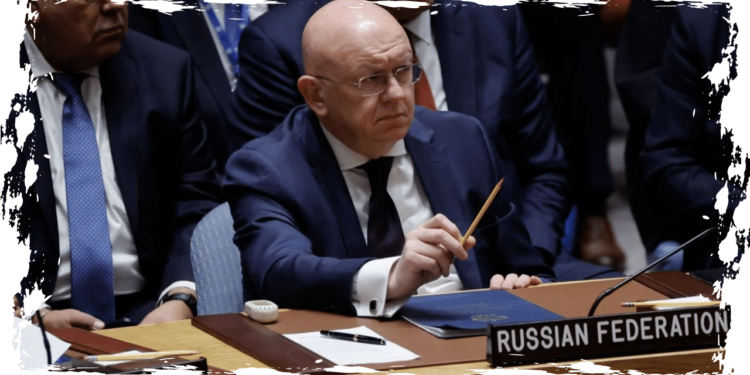The United Nations, for the second time in almost a month, failed to adopt a pioneering resolution supported by Russia. The resolution’s objective is to prevent an arms race in outer space.
The resolution on Monday received votes of approval from Algeria, Ecuador, China, Guyana, Mozambique, Russia, and Sierra Leone. On the other hand, France, Japan, Malta, Korea, Slovenia, Britain, and the United States voted against it.
The resolution required a minimum of nine votes to be passed, with Switzerland being the only country to abstain.
In April, the United Nations’ 15-member security council held a vote, during which Russia vetoed a U.S.- and Japan-sponsored U.N. resolution opposing the deployment of nuclear weapons in space. This veto followed a similar language used in the resolution that was rejected on Tuesday.
In the previous vote, China chose not to cast a vote, while 13 member nations expressed their support for the resolution in April.
During the introduction of Monday’s resolution, the Russian representative accused the western countries and others of trying to depict the Russian Federation in a negative way and impose a specific course of action on them, which they deny having.
According to Vasily Nebenzya, Russia’s United Nations representative, Russia aims to show other U.N. countries its sincere commitment to peace through actions rather than mere words. Nebenzya criticized the previous resolution presented by Japan and the United States, describing it as overtly biased and politically motivated.
He emphasized that today’s vote is a crucial moment of truth for our Western colleagues. He highlighted that the draft of the resolution is comprehensive and reflects the interests and aspirations of an overwhelming majority of UN members.
President Joe Biden recently signed bipartisan legislation, putting a ban on the importation of Russian uranium. This decision comes in the midst of the country’s war with Ukraine. The move is significant as it not only helps the United States reduce its dependency on Kremlin-controlled resources but also cuts off a key revenue source for the Putin regime’s military conflicts.
According to U.S. Ambassador Robert Wood, who serves as the U.N.’s alternate representative for special political affairs, Russia is attempting to divert global attention from its creation of a new satellite equipped with a nuclear device. Ambassador Wood made these comments on Monday, stating that Russia launched the satellite on May 16, placing it in the same low Earth orbit as a U.S. government satellite.
The 1967 Outer Space Treaty aims to prohibit member countries, including the United States and Russia, from deploying any objects equipped with nuclear or other weapons of mass destruction in Earth’s orbit. However, Russia contends that their proposal adequately addresses these concerns, which the U.S has raised objections to.
In February, the White House confirmed that Russia was in the process of developing an “anti-satellite capability.” However, it was emphasized that this capability did not pose an immediate threat. On May 16, the Russian Federation launched a Soyuz-2.1b rocket from the Plesetsk Cosmodrome in northern Russia. At that time, the Russian government did not provide any immediate information regarding the satellite or its mission.
According to Wood, the Russian text presented today does not contribute to the improvement of arms control. Instead, it restricts the scope of initiatives in other United Nations organizations, which could have a negative impact on the prevention of an arms race in outer space.










